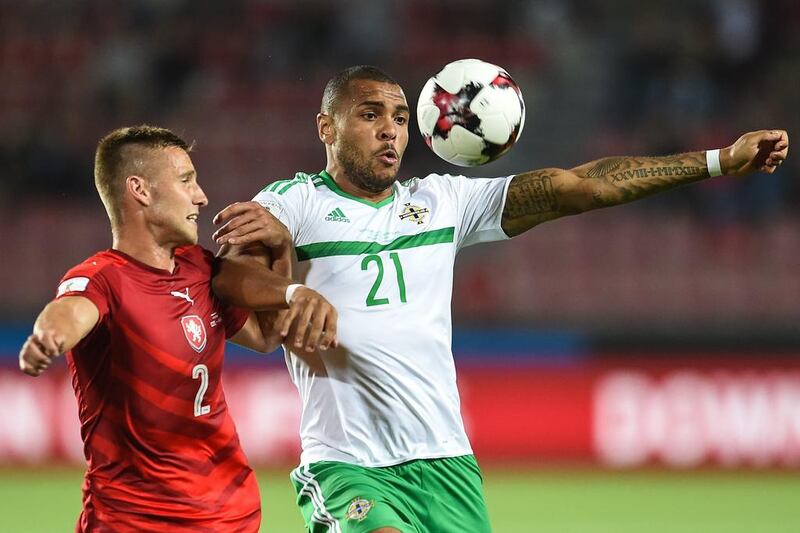Michael O’Neill was relegated in his first game as a manager. Aaron Hughes made his international debut in the 20th century and announced his international retirement six years ago. Josh Magennis was a goalkeeper until 2008 and now he is his country’s first-choice striker.
Each, in his own way, reflects the remarkable elements of the Northern Ireland story. They have been obscured somewhat by Iceland’s overachievers, but while only two of the world’s eight most populous countries will be at the World Cup, a province with a population of 1.8 million could join them. No wonder the winger Stuart Dallas told the BBC: “I don’t think I have enough words to describe what it would mean to the people of Northern Ireland.”
Only Switzerland stand in their way of a place in Russia. Northern Ireland will be underdogs, but then they usually are. Switzerland won nine of their 10 qualifiers, finishing level on points with the Euro 2016 champions Portugal. They are ranked 11th in the world and are looking to reach a fourth consecutive World Cup. Northern Ireland have not played in one since 1986, two years before a teenage winger, O’Neill, made his international debut.
His achievements may have dulled the sense of surprise. They should not.
🎥 @StevenDavis8 should reach 100 caps on Thursday night in the World Cup Play-Offs! Go down memory lane with the Captain... 💚👏🏽 #GAWA pic.twitter.com/5s50pfwpcG
— Northern Ireland (@NorthernIreland) November 7, 2017
“I think the players who have been around the squad for longer know how difficult it is to get consistent results at international level,” said the captain Steven Davis.
There was a point when Northern Ireland’s were consistently bad. But they reached the last 16 of Euro 2016 and have spent the last few years beating sides – Norway, Czech Republic, Ukraine, Greece, Hungary – who, by most logical criteria, ought to be their superiors. But they kept seven clean sheets in 10 qualifiers and have only lost one competitive game in four years at Windsor Park. Even that was to the world champions Germany.
It is a sign of a stunning turnaround. O’Neill, whose time in the dugout began so inauspiciously with the Scottish minnows Brechin in 2006, is no stranger to slow beginnings. He only won one of his first 18 games as Northern Ireland manager as they slipped to 129th in the world.
_________________________
- Zlatko Dalic interview: Al Ain helping Croatian deal with 2018 World Cup qualification pressure
_________________________
He has had to make the most of what seemed a wretched inheritance. Gareth McAuley was considering international retirement when he was appointed. Hughes had already announced his. Now if the two 37-year-old defenders do not figure together it will be because Hughes is a doubt. The defence built around veterans will be pivotal.
"We need it to be close because I don't think we are going to come through a high-scoring tie," O'Neill told the BBC. "It's important not to concede at home.”
The outstanding Jonny Evans will be pivotal in that defensive effort and not just because he is one of only two Northern Ireland players to make more than five Premier League appearances this season. The other is the captain Davis, who is set to win his 100th cap, joining Hughes and the 1982 and 1986 World Cup goalkeeper Pat Jennings in a select club.
🎂 Happy birthday @AaronHughes18 🎉 He made his debut back in 1998! What's your earliest memory of the big man at the back? 💪⚽ #GAWA pic.twitter.com/UScbnysEUW
— Northern Ireland (@NorthernIreland) November 8, 2017
Jennings belongs alongside George Best, Norman Whiteside, Danny Blanchflower, Harry Gregg and the Republic of Ireland manager Martin O’Neill among the province’s greatest players. Some of the current crop are rather lesser talents. This is a triumph of the collective.
O'Neill reflected on his own playing days in Michael Walker's new book Green Shoots. "I enjoyed the two years at Wigan but I was never picked for the international squad," he said. "Now I am consistently picking players from League One."
Magennis, goalkeeper turned Charlton Athletic forward, is one of them. It is no surprise that, as Davis admitted: “We never really made that step to feel as though we were really going to achieve it.”
Then they qualified for Euro 2016, and made it to the knockout stages. Now, once again, Northern Ireland feel they can achieve something seismic.
🎥@Josh_Magennis calls on fans to make as much noise as possible in an “absolutely massive” game for the entire country 🙌🏻💚#DreamBigger #GAWA pic.twitter.com/5P2rT5N5xB
— Northern Ireland (@NorthernIreland) November 7, 2017






